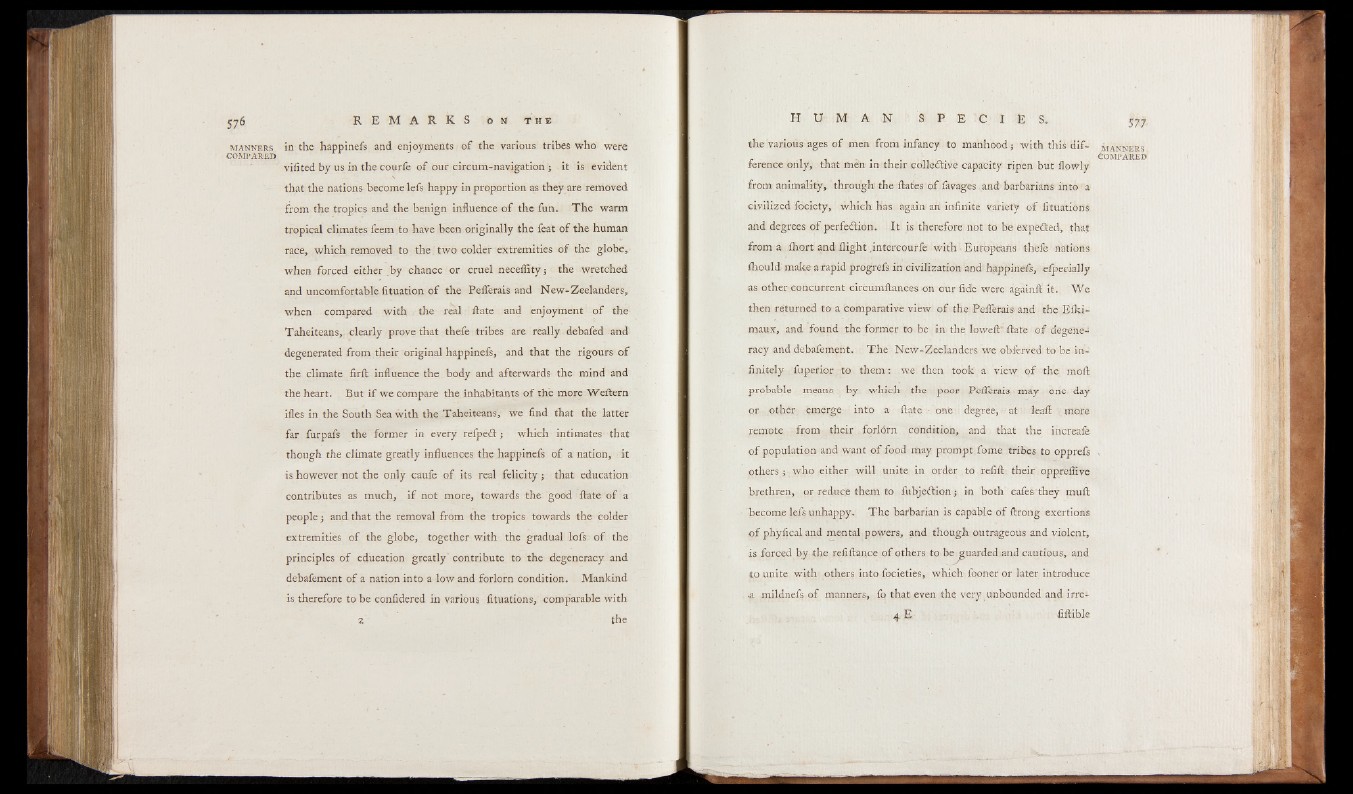
in the happinefs and enjoyments o f the various tribes who were
vifited by us in the courfe o f our circum-navigation ; it is evident
that the nations become lefs happy in proportion as they are removed
from the tropics and the benign influence o f the fun. T h e warm
tropical climates feem to have been originally the feat o f the human
race, which removed to the two colder extremities o f the globe,
when forced either by chance or cruel neceffityj the wretched
and uncomfortable fituation of the Pefierais and New-Zeelanders,
when compared with the real Hate and enjoyment o f the
Taheiteans,. clearly prove that thefe tribes are really. debafed and
degenerated from their original happinefs, and that the rigours o f
the climate firft influence the body and afterwards the mind and
the heart. But i f we compare the inhabitants of the more Weltern
ifles in the South Sea with the Taheiteans, we find that the latter
far furpafs the former in every refpeft; which intimates- that
though the climate greatly influences the happinefs o f a nation, it
is however not the only caule o f its real felicity; that education
contributes as much, i f not more, towards the good Hate o f a
people j and that the removal from the tropics towards the colder
extremities of the globe, together with the gradual lofs. o f the
principles of education greatly' contribute to the degeneracy and
debafement o f a nation into a low and forlorn condition. Mankind
is therefore to be confidered in various lituations, comparable with
2 - the
the various ages o f men from infancy to manhood; with this difference
only, that men in their colledtive capacity ripen but flowly
from animality, through the Hates o f favages and barbarians into-a
civilized fociety, which has again an infinite variety of lituations
and degrees o f perfedlion. It is therefore not to be expected, that
from a Ihort and flight .intercourfe with . Europeans thefe nations
Ihould make a rapid progrefs in civilization and happinefs, efpecially
as other concurrent circumilances on our fide were againll it. We
then returned to a comparative view o f the Pefierais and the E lk i-
maux, and found the former to be in the lowelt' ftate o f degenea
racy and debafement. Th e New-Zeelanders we obferved to be infinitely
fuperior to them: we then took a view o f the moll
probable means by which the poor Pefierais,tmay one- day
or other emerge into a ftate ■ one degree, at leali more
remote from their forldrn condition, and that the increafe
o f population and want o f food may prompt fome tribes to opprefs
others s who either will unite in order to refill their oppreflive
brethren, or reduce them to fubjeftion; in both cafes'they mull
become lefs unhappy. T h e barbarian is capable o f llrong exertions
o f phyfical and mental powers, and though outrageous and violent,
is forced by the reliltance o f others to bejguarded and cautious, and
•to unite with others into focieties, which fooner or later introduce
a mildnefs of manners, fo that even the very unbounded and irre-
4 E fillible